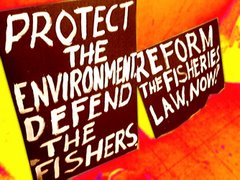http://www.sunstar.com.ph/cebu/whale-difference
A whale of a difference
A PETITION filed on behalf of sea mammals before the Supreme Court, in relation to the 2007 search for oil in the Tañon Strait, will stretch the limits of the law.
Supreme Court Chief Justice Reynato Puno said so himself, in a speech at the University of the Cordilleras in Baguio City last April 16. The forum focused on environmental justice.
In Puno’s speech, a copy of which was sent toSun.Star Cebu, the chief justice discussed the implications of the novel case involving the “resident sea mammals of the Tañon Strait, which include toothed whales, dolphins, porpoises and other cetacean species,” suing a Japanese company and government agencies in relation to the oil exploration off the shores of Pinamungajan town.
"The Manny Pacquiao Blog". Click here for stories and updates on the Filipino boxing champ.
“The intriguing issue is whether a dolphin or whale can sue an oil exploration firm. If I cite this case, it is only to stress the ongoing attempts to further open the doors of courts to plaintiffs who are non-humans alleged to be entitled to a healthy environment,” Puno said in his speech.
The forum, “Upholding the Right to a Balanced and Healthful Ecology,” aimed to draft recommendations for better actions on environmental issues brought before the Supreme Court.
This gave Puno, the keynote speaker of the event, a chance to talk about locus standi, or standing, in terms of filing cases.
He recalled the “benchmark” case of Oposa versus Factoran, where unborn children and “future generations” were given a locus standi to sue, especially in cases involving the environment.
“We recognized the budding principle of inter-generational equity, which assures each generation the right to receive the planet in no worse a condition than received by the previous generation, and views the environmental and resource conservation obligations of the present generation from that perspective,” said Puno.
In the case of the mammals, it is still ongoing.
The petition was for certiorari with mandamus and injunction, filed in a bid to stop offshore explorations by the Japan Petroleum Exploration Company Ltd. (Japex).
How far?
Japex ended the oil exploration by early 2008. They never made it to a full-blown oil drill, with the company saying the available oil was not of commercially viable volumes.
Government agencies were impleaded in the Supreme Court petition for allowing the exploration to happen in the first place.
Oil explorations, said the petitioners, would damage their habitat. The mammals were represented by lawyers Gloria Estenzo-Ramos and Rose-Liza Eisma Osorio, acting as their guardians.
“Exactly how far the rule on standing is to be liberalized is the question,” Puno said in Thursday’s speech.
The chief justice noted, though, that relaxing the rule on locus standi has its disadvantages.
“Fears are expressed that this will open the floodgates to environmental litigation, many of which may be groundless, especially those filed by bounty hunters. They can drive away investment companies and they can contribute to the overclogging of our green court dockets,” Puno also said.
Environmental champions may even be sued for damages for initiating complaints to discourage them from pursuing it.
“Our task is to craft a rule that will strike the proper balance between the need to encourage citizens’ suits and the danger that unregulated citizen’s suits may bring about nuisance cases,” Puno said.
Some environmentalist-lawyers who attended a related forum in Iloilo City expressed optimism in the Tañon Strait mammals’ case.
They attended the “Forum on Environmental Justice: Upholding the Right to a Balanced and Healthful Ecology” in Iloilo City, an event the Supreme Court organized.
“This activity encourages us to actively pursue more actions to protect our environment. Truly the Supreme Court under Chief Justice Puno now remains as the only institution who stood by the people, under attack by oppressive anti-environment policies of the government,” said Vince Cinches, executive director of the Fisherfolks’ Development Center (Fidec) Inc.
In a press statement released by Ghianne Rada, Fidec described the forum as “most welcome in a time where global climate change is wreaking havoc on our lives.” (JGA/EOB)
Saturday, April 25, 2009
A whale of a difference
Labels:
cebu oil,
FIDEC,
fisherfolks,
stscm,
supreme court,
tanon,
vince cinches
Subscribe to:
Post Comments (Atom)





No comments:
Post a Comment